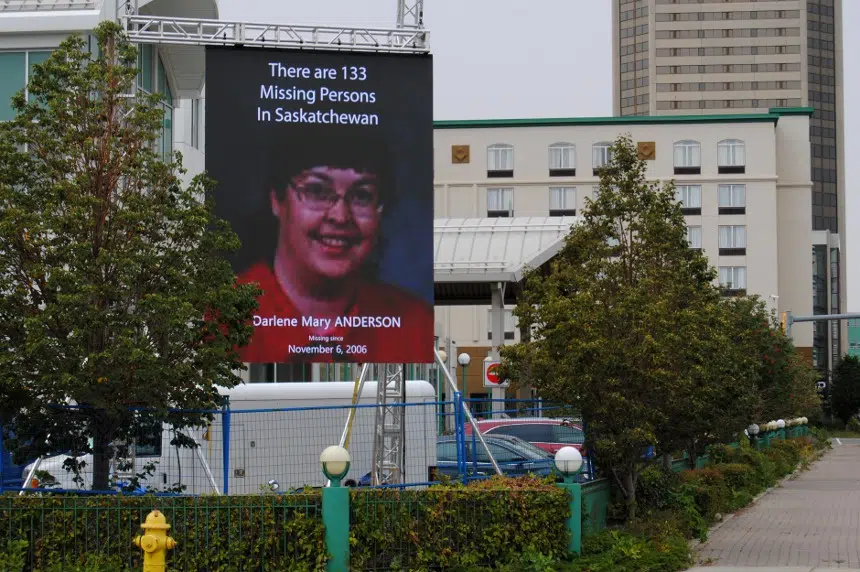This week, there’s a large video billboard sitting outside the new Regina Police Service headquarters building on Saskatchewan Drive.
The billboard flips through photos, with names printed underneath, and the legend at the top of the screen says there are 133 missing persons in Saskatchewan.
The billboard is there for missing persons week in the province and the police service is trying to get the message out to those families that they’re not alone.
One of the people the police have to help the families of those missing is Rhonda Fiddler. She’s the missing persons liaison with victims’ services within the Regina Police Service.
Fiddler offers support and referrals to services like counselling to the families.
“It’s always different with every family,” explained Fiddler.
There are 133 long-term missing persons in the province, and 18 of them are from the Regina area.
Fiddler said when victims’ services officials first get contact with family, they’ll do a needs assessment and find out what needs to be taken care of first — possibly things like financial or child-care issues.
Whatever the family is dealing with, Fiddler said it’s not an easy time.
“When you are looking at a family where, for some, there are past addiction issues, we might see some relapse happening,” Fiddler said.
“We may see job loss. We may see depression. There’s a lot of different factors that can come into play because, on a daily basis, they are living with the fear and the anxiety and this ambiguity of no answers, and what happened to their loved one and where are they, and why aren’t people saying anything?”
And even if the person has been missing for years, Fiddler said it doesn’t get easier.
“Every day for the family is like Day 1; as time goes on, they just learn how to continue living. They manage their care better (and) they manage their anger better, but it’s all still there. It’s all just under the surface and it will be until they have those answers,” said Fiddler.
Fiddler herself has experience with missing family members. She said her daughter wandered off for a time when she was small, and a few years later a nephew went missing for quite a while. She said it was terrifying, and the fear never goes away.
It can be a tough job as well for Fiddler.
“It is not one of those things that’s easy where you can just put it on the shelf at the end of the work day and go home and not thing about it again until 8 o’clock tomorrow morning. (The missing persons) are with you. They’re always with you,” said Fiddler.
“I’m always wondering about them, I’m always wondering about their missing loved ones, and I’m always hoping that we find those answers. I mean, I totally get their frustration because I get frustrated too.”
Fiddler doesn’t deal with all missing persons cases. She said major crimes or search and rescue have to be involved, the case has to be suspicious or unusual, or a family member wants or is identified to benefit from services.
COVID-19 has changed how Fiddler has been able to do her work. Normally in victims’ services there are volunteers there to help, but this year Fiddler said they haven’t been able to be as busy with families.
“Typically I like to go and meet with my families and go for coffee and we just have that listening and supportive kind of discussion of how things are going, that needs assessment. And with COVID I haven’t been able to do that,” said Fiddler.
Fiddler just wants people to know that victims’ services is there to support them, and if they have a missing loved one — no matter how long they’ve been missing — they should reach out.
“We just really want them to know that we’re here and we’ll help them best we can to get the supports that they need,” said Fiddler.











